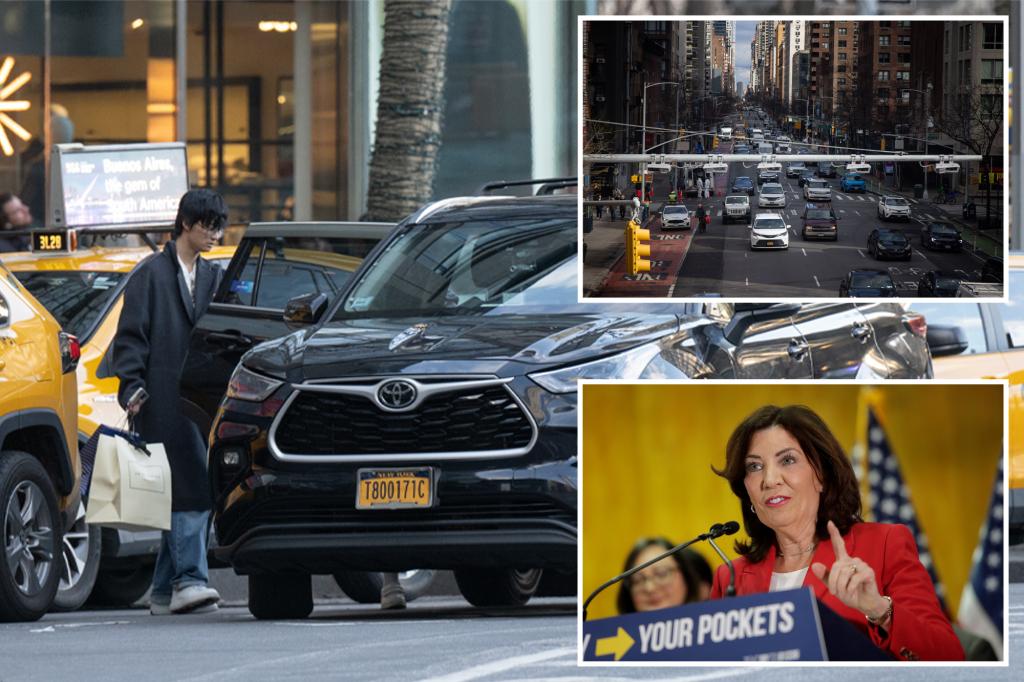The implementation of congestion pricing in Manhattan has ignited a controversy, with ride-hailing giants Uber and Lyft emerging as key beneficiaries despite their substantial financial investments in lobbying for the very policy. Between 2015 and 2019, Uber alone invested $2 million in promoting congestion pricing, a significant portion of which went towards engaging influential city lobbyists. Both Uber and Lyft have continued this lobbying effort, employing high-profile lobbyists to sway key figures like Governor Kathy Hochul and the Metropolitan Transportation Authority (MTA) towards approving the controversial toll. While the exact expenditure on congestion pricing lobbying remains undisclosed due to the multifaceted nature of lobbyists’ work and the lack of detailed public records, the companies’ dedication to this cause is undeniable.
The ride-hailing companies’ support for congestion pricing stems from the potential financial gains they stand to make. The new surcharge structure favors them, charging a lower fee compared to private vehicles ($1.50 vs. $9) and even compared to public transportation ($1.50 vs. $2.90). Critics argue that this pricing scheme allows Uber and Lyft to capitalize on the limited street space in core Manhattan, charging premium prices for access while passing the additional costs onto their customers. This effectively transforms congestion pricing into a revenue stream for the companies while burdening regular drivers with the true cost of reduced traffic. Moreover, the city’s lifting of the cap on for-hire vehicles in 2022 has further fueled the growth of these services, exacerbating traffic congestion and potentially undermining the intended benefits of congestion pricing.
Opponents of congestion pricing, like Councilman Robert Holden, denounce the ride-hailing companies’ involvement as “corporate greed at its worst.” They argue that these companies are manipulating the system to their advantage while contributing to the city’s traffic woes. This sentiment is echoed by Susan Lee, a plaintiff in lawsuits aiming to halt congestion pricing. She accuses the for-hire vehicle industry of instigating congestion pricing while simultaneously contributing to gridlock with their vast fleet of approximately 100,000 vehicles. Lee advocates for a fee structure that aligns with the cost of public transportation, incentivizing the use of subways and buses instead.
The controversy surrounding congestion pricing highlights the complex interplay between private interests, public policy, and urban planning. While proponents argue that the toll will reduce traffic congestion and generate revenue for the MTA, critics contend that it disproportionately benefits ride-hailing companies at the expense of private drivers and potentially even public transportation. The relatively lower surcharge for ride-hailing services raises concerns about exacerbating the existing imbalance in transportation options, potentially making private car ownership even less appealing while encouraging greater reliance on app-based services.
Uber and Lyft, despite acknowledging their support for congestion pricing, maintain that the current implementation is flawed. Uber’s spokesperson, Josh Gold, while affirming the company’s early and continued support for the concept, cautions against the government’s reliance on raising prices and fees without considering the potential consequences. Lyft’s spokesperson, CJ Macklin, echoes this sentiment, supporting congestion pricing but emphasizing the need for equitable implementation. He points out that the ride-hailing industry has already been contributing through a congestion fee since 2019, generating over $1 billion for the MTA. Both companies argue against what they perceive as “double taxation” for their riders and claim to have lobbied extensively for an exemption from the additional $1.50 congestion fee.
The debate over congestion pricing in New York City goes beyond a simple traffic management issue. It reflects larger questions about the role of private companies in shaping public policy, the equitable distribution of costs and benefits of urban infrastructure projects, and the long-term vision for transportation in a densely populated metropolis. The significant financial contributions of Uber and Lyft to lobbying efforts, coupled with the perceived advantages they stand to gain from the current pricing structure, fuel skepticism and raise concerns about the true motivations behind the policy and its potential long-term impact on the city’s transportation landscape. The legal challenges and ongoing public discourse underscore the need for a comprehensive and transparent evaluation of congestion pricing’s effects, ensuring that it serves the broader public interest rather than primarily benefiting powerful private entities.










